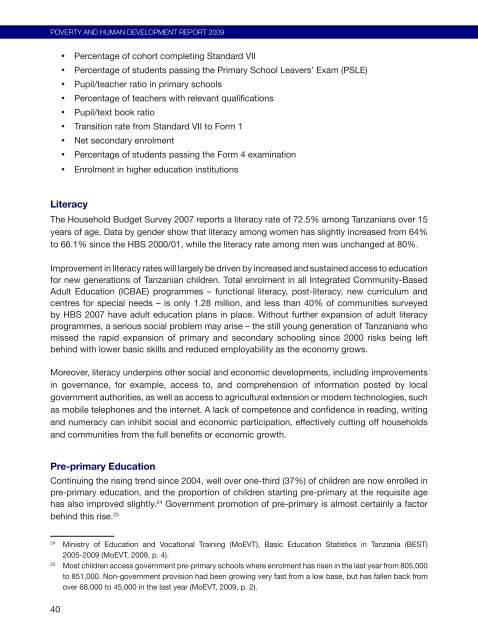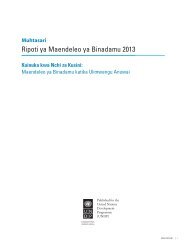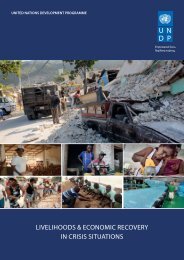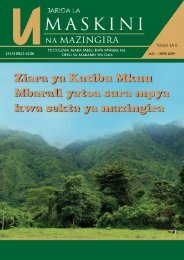Poverty and Human Development Report 2009 - UNDP in Tanzania
Poverty and Human Development Report 2009 - UNDP in Tanzania
Poverty and Human Development Report 2009 - UNDP in Tanzania
You also want an ePaper? Increase the reach of your titles
YUMPU automatically turns print PDFs into web optimized ePapers that Google loves.
POVERTY AND HUMAN DEVELOPMENT REPORT <strong>2009</strong><br />
•<br />
•<br />
•<br />
•<br />
•<br />
•<br />
•<br />
•<br />
Percentage of cohort complet<strong>in</strong>g St<strong>and</strong>ard VII<br />
Percentage of students pass<strong>in</strong>g the Primary School Leavers’ Exam (PSLE)<br />
Pupil/teacher ratio <strong>in</strong> primary schools<br />
Percentage of teachers with relevant qualifications<br />
Pupil/text book ratio<br />
Transition rate from St<strong>and</strong>ard VII to Form 1<br />
Net secondary enrolment<br />
Percentage of students pass<strong>in</strong>g the Form 4 exam<strong>in</strong>ation<br />
• Enrolment <strong>in</strong> higher education <strong>in</strong>stitutions<br />
Literacy<br />
The Household Budget Survey 2007 reports a literacy rate of 72.5% among <strong>Tanzania</strong>ns over 15<br />
years of age. Data by gender show that literacy among women has slightly <strong>in</strong>creased from 64%<br />
to 66.1% s<strong>in</strong>ce the HBS 2000/01, while the literacy rate among men was unchanged at 80%.<br />
Improvement <strong>in</strong> literacy rates will largely be driven by <strong>in</strong>creased <strong>and</strong> susta<strong>in</strong>ed access to education<br />
for new generations of <strong>Tanzania</strong>n children. Total enrolment <strong>in</strong> all Integrated Community-Based<br />
Adult Education (ICBAE) programmes – functional literacy, post-literacy, new curriculum <strong>and</strong><br />
centres for special needs – is only 1.28 million, <strong>and</strong> less than 40% of communities surveyed<br />
by HBS 2007 have adult education plans <strong>in</strong> place. Without further expansion of adult literacy<br />
programmes, a serious social problem may arise – the still young generation of <strong>Tanzania</strong>ns who<br />
missed the rapid expansion of primary <strong>and</strong> secondary school<strong>in</strong>g s<strong>in</strong>ce 2000 risks be<strong>in</strong>g left<br />
beh<strong>in</strong>d with lower basic skills <strong>and</strong> reduced employability as the economy grows.<br />
Moreover, literacy underp<strong>in</strong>s other social <strong>and</strong> economic developments, <strong>in</strong>clud<strong>in</strong>g improvements<br />
<strong>in</strong> governance, for example, access to, <strong>and</strong> comprehension of <strong>in</strong>formation posted by local<br />
government authorities, as well as access to agricultural extension or modern technologies, such<br />
as mobile telephones <strong>and</strong> the <strong>in</strong>ternet. A lack of competence <strong>and</strong> confidence <strong>in</strong> read<strong>in</strong>g, writ<strong>in</strong>g<br />
<strong>and</strong> numeracy can <strong>in</strong>hibit social <strong>and</strong> economic participation, effectively cutt<strong>in</strong>g off households<br />
<strong>and</strong> communities from the full benefits or economic growth.<br />
Pre-primary Education<br />
Cont<strong>in</strong>u<strong>in</strong>g the ris<strong>in</strong>g trend s<strong>in</strong>ce 2004, well over one-third (37%) of children are now enrolled <strong>in</strong><br />
pre-primary education, <strong>and</strong> the proportion of children start<strong>in</strong>g pre-primary at the requisite age<br />
has also improved slightly. 24 Government promotion of pre-primary is almost certa<strong>in</strong>ly a factor<br />
beh<strong>in</strong>d this rise. 25<br />
24 M<strong>in</strong>istry of Education <strong>and</strong> Vocational Tra<strong>in</strong><strong>in</strong>g (MoEVT), Basic Education Statistics <strong>in</strong> <strong>Tanzania</strong> (BEST)<br />
2005-<strong>2009</strong> (MoEVT, <strong>2009</strong>, p. 4).<br />
25 Most children access government pre-primary schools where enrolment has risen <strong>in</strong> the last year from 805,000<br />
to 851,000. Non-government provision had been grow<strong>in</strong>g very fast from a low base, but has fallen back from<br />
over 68,000 to 45,000 <strong>in</strong> the last year (MoEVT, <strong>2009</strong>, p. 2).<br />
40





